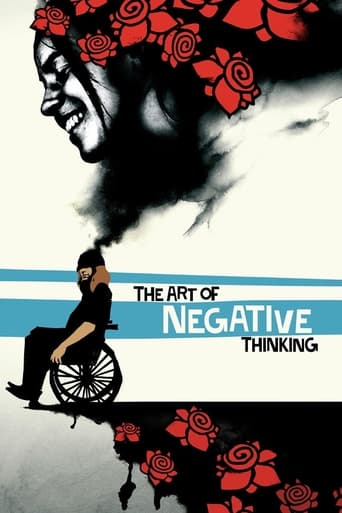

Amateur movie with Big budget
... View MoreThe first must-see film of the year.
... View MoreI didn’t really have many expectations going into the movie (good or bad), but I actually really enjoyed it. I really liked the characters and the banter between them.
... View MoreStory: It's very simple but honestly that is fine.
... View MoreVery few movies are made about disabled people. It seems to be a taboo area that few filmmakers are willing to venture into, as they do not want to make a tearjerker propaganda film that manipulates people's feelings or appear to be too insensitive about the issue. This film does neither; instead, through realistic characters, it takes the honest approach and allows the audiences to examine the characters and understand how they feel without the filmmakers help. Thus, it makes the film enticing and provocative.The film examines the different degrees and dimensions of both physical and emotional disability and how it affects those around them. It shows how some people are down on themselves and refuse to improve or become worst than they are. It shows how those disabled can increase pressure and frustration on those closest to them, and vice-versa, how those closest to them can cause them pain and suffering, even if they had the best of intentions. Finally, it shows that acceptance, both the disabled and those around them, is a process. It takes time and patience; if one does not have the patience, it is better off if that person leaves.One thing to take away from this film, as it offers a great lesson: there must be a balance between positive and negative thinking. Being too positive and smiling all the time might not be such a good tactic in life. Just look at Marte. She tries to be positive in order to protect her partner's feelings; instead, he feels very guilty and does not appreciate her efforts. However, at the same time, being too negative will only sent one into depression, as Lillemor demonstrates. She is rather healthy, but because she is so down on herself, she thinks she is no better than the disabled people she associates with. Therefore, in the end, one must be both positive and negative. This way, a person would be able to examine the reality of the situation and have the courage to move forward.8/10
... View MoreI recently saw this at the 2008 Palm Springs International Film Festival and of the 38 films I saw there this year, the Art of Negative Thinking has emerged as my film favorite. Fist of all, this is a small film shot in 20 days with little obvious budget. Almost the entire film is filmed on location in a house and besides the cast, the most expensive overhead was probably the rights to use Johnny Cash and some other great 60's 70's music and some snippets of a few movies. This is a dark comedy and the comedy is very, very funny and it's usually unexpected and right around the corner throughout the film. What makes this film all the more amazing is it is the debut feature film from it's writer/director Bård Breien both as a writer and as a director. Geirr (Fridtjov Såheim) is a paraplegic whose once idyllic life of matrimonial bliss to Ingvild (Kirsti Eline Torhaug) has been shattered by his paralysis. Ingvild wants to stay with him but Geirr has withdrawn from her and the world and spends his days watching 1970's Vietnam themed films on TV and listening to Johnny Cash records while he gets drunk and smokes pot, living on pizza, wearing an Army jacket and a silly cap and harboring an unhealthy fascination with handguns. Tori (Kjersti Holmen) is a national health psychologist who is the head of a state run positivity group program for victims of paralysis. Ingvild has contracted Tori to try to enroll Geirr in her program and since Gierr is naturally resistant to the idea, Tori takes her group to him. Marte (Marian Saastad Otteson) is a quadriplegic who is Tori's star pupil in positive thinking. Gard (Henrik Mestad) is Marte's boyfriend who has joined the group in support of Marte. Asbjørn (Per Schaaning) is a once successful businessman who as the result of stress and alcoholism suffered a debilitating stroke. Lillemar wears a neck brace for sympathy but is a bitter 65 year old divorcée. This is a great ensemble cast with each a memorable character. This is one of those films that makes me laugh days and weeks after seeing it. I would give this a 10 out of 10 and highly recommend it.
... View MoreI was looking forward to this movie for months. And not because I studied in Norway, but because we are overwhelmed with American love stories, sad stories, catastrophic movies, movies that have to last at least 2 hours and make your body ache with pain. I just wanted to see a movie that has actually something to say, can say it clearly enough and be entertaining at the same time. And it all came true! This film is very much about the fact, that feeling depressed and angry can be sometimes more useful that false positive and light-hearted approach. It helps the pain go away much faster and you can finally, at this desperate and hopeless moment, start a new chapter of your life with a clean slate. Things that we all keep in our minds and are ashamed to think of or even to say aloud are spoken and discussed vividly here with all the logical consequences. And with all this said, you will rather laugh through out this movie than cry or have deep thoughts. They come later :-)
... View MoreThis movie is actually very special. Not many movies have been this straight forward and cut through THAT much bullshit when it comes to people feeling sorry for themselves. Finally a movie that doesn't walk the straight line where an overly positive person makes everything better or an overly negative person destroys everything. In this movie the the two different ends meet and wreaks havoc. The movie was shot in 20 days and that is quite astonishing..they punch through a wall or two when it comes to taboo areas and in an intelligent and interesting way. If you're gonna watch a Norwegian movie this year or the next I would recommend you see this. It has a lot of fantastic funny moments and if you like the Danish movie FESTEN or the American movie RUNNING WITH SCISSORS you will surely like this one. I'm not a big fan of Norwegian movies, but this one actually has a nerve that most movies lack...what nerve is that? Just go and see it.. :)
... View More